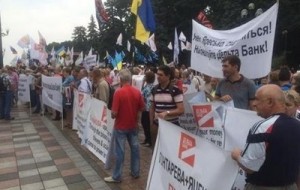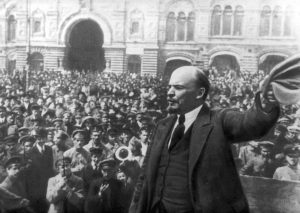
Ukrainian bank depositors protest outside their national parliament the disappearance of their funds.
Ukraine’s western friends can’t help until the blinkers come off.
“Save Ukraine!” went up the cry from the columns of a most respected newspaper.
On 20 July The Wall Street Journal published an op-ed piece entitled “Crucial Weapon in the Defense of Ukraine.”
Its authors were Stephen J. Hadley, a former national security adviser to president George W. Bush and Robert B. Zoellick, a former World Bank president, US trade representative and deputy-secretary of state, also under president George W. Bush.
The kicker to the article summed up admirably the Hadley-Zoellick case for Ukraine:
“Without debt reduction and more aid, a young democracy could vanish.”
There was much in what followed this trumpet blast that was perfectly sound. For instance:
“If Ukraine’s economy collapses … there can be no successful defense of its territory and independence.”
Certainly.
“Russia does not have to conquer Ukraine; it can bleed its economy until the society and government collapse.”
Exactly.
The article then went on to argue that the Ukraine government and its reform program would unravel unless it gets debt relief.
All too likely.
At the same time, however, Hadley and Zoellick present Ukraine’s government as a promising team of reformers in the liberal free-market mould.
“ … the IMF has … been impressed by the Ukrainian government’s efforts to reform an opaque system that for too long fuelled corruption not growth.”
“The Ukrainian government has announced plans for police and judicial reforms, international audits, tax simplification, laws to protect investors, privatisations and land reforms.”
Rats
Oh dear, I smell a rat; in fact, more than one: “announced plans”; “laws to protect investors”; “land reforms”! Who in the IMF have Hadley and Zoellick been talking to? And from whom in Ukraine is the IMF getting its intelligence? Let’s just take “land reforms”: it’s off the agenda, gentlemen.
Ukrainians are attached to their land in a way that Westerners have long ceased to be. Among Ukrainians there is a visceral aversion to selling land to foreigners and to creating large privately owned estates. As it stands, Ukrainian law has not stopped the development of huge rural enterprises, as the fortunes of agricultural oligarch – and failed banker – Oleg Bakhmatyuk, attest. There is, however, simply no constituency in Ukraine for a land reform that would be attractive to Washington or Brussels. Promises of that kind should not be taken seriously. Everyone in Ukraine understands this.
And what about “laws to protect investors”? Would you seriously trust a government to deliver on investor protections that presides over the mass destruction private property in the form of bank accounts?
Which brings me to the biggest, smelliest rat of all. It is what the article doesn’t say that is really on the nose. How odd that Hadley and Zoellick should write about IMF activities in Ukraine without mentioning the word “banks”.
The unmentionable
Since the overthrow of the Yanukovych government, one-in-four US dollars advanced by the IMF to Ukraine have been to refinance Ukraine’s under capitalised, over lent, illiquid banks.
Many of the banks that have benefited from these IMF refinancing loans have gone on to fail and have been liquidated by Ukraine’s banking authorities.
In short, a great deal of IMF-sourced money has been wasted. More than that, it has disappeared along with depositors’ funds from the liquidated banks.
I have written before about the Ukraine banking crisis: first here and then here.
The IMF knows quite well that it has been ripped off. But it has thought it impolitic to say so.
The nearest the IMF has come to admitting losses on its Ukraine operations was a Delphic remark in its Ukraine: IMF Country Report (No.15/69, March 2015, p.18) to the effect that Ukraine banking system’s capital adequacy ratios actually fell in the course of the bank refinancing program.
How come?
As we all know – at least we ought to know – money does not spontaneously combust. When it “disappears,” it is because it has been transferred, either by incompetent lending practices or by malfeasance, into other accounts. It is not that the money has vanished; it’s that the recipient accounts are hard to find.
It is one thing to have an intellectual certainty, in cases like this, that money has been misappropriated; it is another, however, to have evidence that one can bring to court.
Delta Bank
Happily, such evidence is beginning to leak, even in Ukraine. Some brave souls – as of writing, persons unknown but probably aggrieved and publicity shy bank customers – have persuaded the office of Prosecutor General of Ukraine to investigate the affairs of Delta Bank JSC.
Delta is one of the 53 banks liquidated since the collapse of the Yanukovych government.
As we all know — at least we ought to know — money does not spontaneously combust.
According to bank watcher, Yuri Skolotyany, Delta was the fourth largest Ukrainian bank in terms of assets – $US 60.3 billion or 4.6% of total system assets – or the third largest in terms of volume of deposits by individuals – $US 23.97 billion or 5.7% of total deposits.1
The National Bank of Ukraine (NBU) liquidated Delta on 3 March 2015. Its CEO and leading investor was the oligarch banking hot shot, Mykola Lagun. Figures compiled from NBU sources show that, during the year prior to its liquidation, Delta benefitted from refinancing loans valued at 10.88 billion UAH. 2
The investigation
Sitting on my desk is a translation of a Court Order issued by the Pechersk District Court in Kyiv, Case No. 757/22691/15-k, dated July 1, 2015.
On that day, in the said court, investigative judge, Pisanets V.A., heard an application by a senior investigator from the Prosecutor General’s Office (PGO) for “permission to conduct an unscheduled audit of financial and economic activity…”
The chief target of the audit was Delta Bank. Simultaneous “counter audit inspections” were also requested for 16 related entities. The audits were to cover the period from “2012 to 02.03.2015.”
According to the investigating officer’s application, the PGO was conducting
“a pre-trial investigation in [a] criminal proceeding … for embezzlement of public funds provided as refinancing for JSC ‘Delta Bank’, by officials of the banking institution as well as officials of the National Bank of Ukraine …”
The application confirms that Delta had received in 2014 about 10 billion UAH in refinancing loans from the NBU.
The application alleges that of this sum, 4.1 billion UAH was used to purchase $US 535.3 million and that these US dollars were transferred abroad to the accounts of “12 interconnected Ukrainian entities”.
Of these 12 “entities,” seven shared the same Kyiv address – Chyhorina Street #49, Kyiv City – and all held accounts in the same bank – Latvian JSC Baltic International – to which various sums, specified by the prosecutor, had been dispatched.
Of the remaining five “entities” registered at other Kyiv addresses, three also held accounts with JSC Baltic International and two held accounts, respectively, with Amsterdam Trade Bank NV and another Latvian bank, AS Trasta Komercbanka.
The PGO application goes on to observe that “Agreements signed by these companies have signs of being fictitious and aimed at embezzling funds received from the NBU refinancing procedure.”
One of the beneficiary “entities” was registered under the name of LLC “Bonnie and Clyde” which just goes to show that the alleged scamsters don’t lack a sense of humour. You’d be laughing too if $US 116 million, for which you never had to lift a finger, landed in your Latvian account.
The presiding judge granted the PGO’s application in full and added to the prosecutor’s investigative tasks a series of questions to be answered about the operations of Delta Bank and related companies during 2012-2015.
Breaking silence
Now, obviously, sanction for a criminal investigation does not establish the commission of a crime. It is, though, the first break in the great silence that, until now, has enveloped Ukraine’s main public institutions over the country’s banking crisis.
Nor does this court ruling establish that monies “disappeared” from other such banks have gone “missing” by the same prima facie criminal means. It does, however, provide the beginnings of an independent confirmation of the common sense hypothesis on how money entrusted by millions of middle class Ukrainians to their banks has apparently “vanished”.
Of the 53 banks to have gone under, the leading oligarch-controlled banks to fall, after refinancing, were these:
- Delta – Mykola Lagun: 10.88 billion UAH refinancing loan;
- VAB – Oleg Bakhmatyuk: 3.71 billion UAH refinancing loan;
- Financial Initiative – Oleg Bakhmatyuk: 7.13 billion UAH refinancing loan;
- Nadra – Dmitry Firtash: 3.3 billion UAH refinancing loan.
The list is by no means exhaustive: it’s just the “pick” of the crop.
Now, you tell me: how is it that the IMF did not brief Hadley and Zoellick about these matters? Or were they briefed, but agreed to share the IMF’s embarrassed discretion?
It wouldn’t really fit the mantra – would it? – to suggest that the “good guys” in Ukraine might be fleecing the Ukrainian people far more extensively than Viktor Yanokovych ever dreamed of. He at least was chiefly preoccupied with “taxing” the oligarchs in his family’s interest. The new configuration of oligarchs and their cronies now running Ukraine have directly attacked the savings of the middle class people who brought the new government to power.
Hadley and Zoellick need to “fess up” to what they left out of their account of what’s happening in Ukraine.
They, and their kind, need to go public and explain to President Poroshenko and Prime Minister Yatsenyuk that neither of them will survive politically, nor will Ukraine’s “European Choice”, unless they restore what has been lost to (or stolen from) middle class Ukrainians.
The key aspiration of the Maidan was an honest government and a clean civil service. Poroshenko and Yatsenyuk are finished if they can’t deliver on that.
The Orange revolution failed. The Maidan revolution is teetering on the brink of failure. If it should also end in despair, what comes next: a Weimar scenario, or just a long slow disintegration?
_____________________________________
This article first appeared here.









Comments